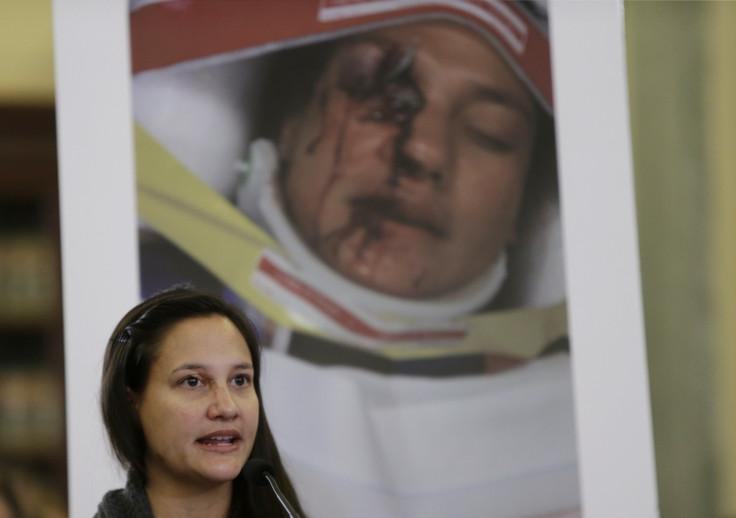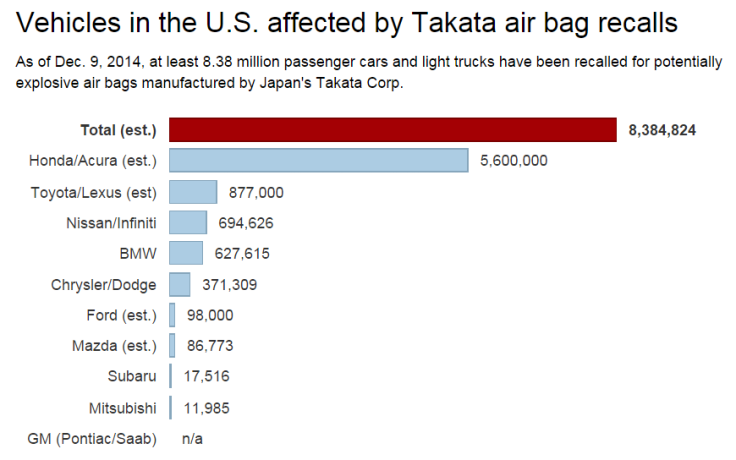Takata Recalls: Honda Says Air Bag Maker Cannot Be Relied On

Fed up with the way Takata Corporation is responding to a global recall of millions of its defective air bag systems, Honda and Mazda both said Tuesday they’re expanding previously announced recalls of their vehicles. Honda became the first auto company to complain publicly about the way Takata is handling the problem.
“We cannot rely on Takata to find the cause,” Honda Motor Co. President Takanobu Ito told Japan’s economic newspaper Nihon Keizei Shimbun in a report published Tuesday. “We should have taken action based on the view it’s a vehicle problem instead of a parts problem.”
Five days after Honda announced it was adding about 3 million more of its vehicles in the U.S. to a growing list of affected vehicles across at least 10 manufacturers, Ito said Honda will soon implement a worldwide recall and deploy its own engineers to find out the root cause of the problem that’s been linked to at least five deaths. The flaw can cause air bags to deploy violently, spiting bits of metal through the balloon’s fabric and into the vehicle’s cabin. Drivers and possibly passengers can be injured in even light collisions from which they would otherwise walk away unscathed.
Honda and its luxury automaker brand Acura had about 5 million affected vehicles in the United States before Friday’s announcement. The company has recalled 13 million vehicles worldwide since 2008 for the faulty air bag. But because of the volume of recalls in recent months, estimates vary wildly about how many vehicles are affected in the United States. Attempts by International Business Times to gather specific numbers from the U.S. National Highway Traffic Safety Administration (NHTSA) have gone unanswered.
Mazda announced Tuesday that it was following Honda’s lead and will soon expand its air-bag-related recall to cover the entire United States, adding to the nearly 87,000 of its vehicles already under recall.

Takata remains insistent that cars that were purchased or are registered in hot and humid climates need to be given priority for replacement air bag inflators. Though the company has been reticent to outline the specific nature of the flaw and its cause, it says moisture penetrating the inflator and altering the chemical formula inside leads to the violent overinflation. Hot and humid atmospheric conditions increase the likelihood of this moisture contamination, it says.
Adding to the problem, Takata doesn’t have the manufacturing capacity right now to produce replacement parts fast enough to meet demand. So, many owners who want their systems fixed will have to wait.
Critics point out that regional recalls are insufficient because cars can move from one part of the country to the other. Furthermore, they’re demanding that the air bag recall extend to passenger side units as well. Currently automakers are not required by the NHTSA to expand their recalls to cover all affected vehicles, nor is it extending the recall to passenger side air bags, leaving it up to each automaker to decide for itself how to handle the problem.
“All we want is for Takata give us a copy of what they’ve turned over to NHTSA and to Congress so we can determine what actions we can take on behalf of our clients,” said Peter Prieto, a partner at Podhurst Orseck, a Miami-based law firm that filed the first lawsuit against the Japanese air bag manufacturer on behalf of vehicle owners and used car dealers who claim that the air bag recalls have made their cars less attractive to sell. “Right now, since we don’t have any documents, we’re trying to find out: One, what is the defect? And more importantly, how widespread is it?”
Prieto’s firm is asking that about 40 class-action lawsuits related to the air bag recalls be consolidated in the Southern District of Florida. The next hearing by the Judicial Panel on Multidistrict Litigation, which decides on class-action lawsuits and where they should be heard, is scheduled in Miami for Jan. 29, 2015.
Last month, members of the Senate Commerce Committee slammed Takata for not erring on the side of caution and expanding its own recall of the parts to all affected vehicle regardless of brand or location.
© Copyright IBTimes 2024. All rights reserved.






















